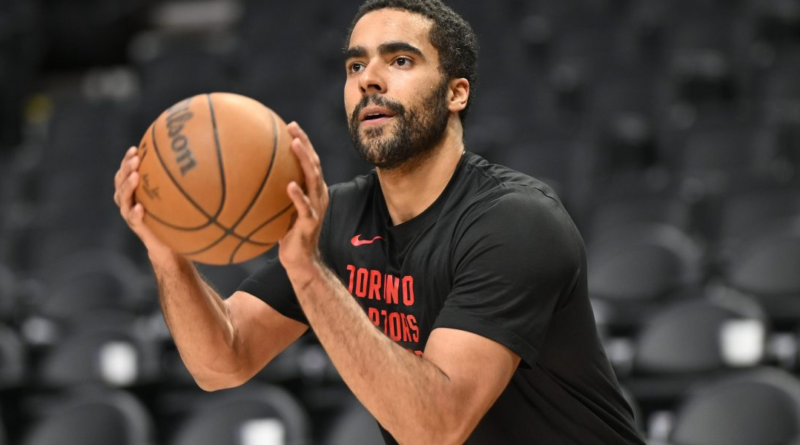The NBA just issued its first gambling ban in 70 years, booting Jontay Porter for committing the league’s ‘cardinal sin’
The NBA has put its sneaker-clad foot down on players’ sports betting. The league banned Toronto Raptors forward-center Jontay Porter for life after he shared confidential information with bettors and limited his own play time to fulfill certain bets, it said in a Wednesday announcement. It’s the first time in 70 years that the league has banned a player for gambling.
“There is nothing more important than protecting the integrity of NBA competition for our fans, our teams and everyone associated with our sport, which is why Jontay Porter’s blatant violations of our gaming rules are being met with the most severe punishment,” NBA Commissioner Adam Silver said in the release.
Silver called the players’ betting a “cardinal sin” in the sport. League rules say that no NBA employees, including players, coaches, and referees, are allowed to gamble on NBA games. In March, Minnesota Timberwolves player Rudy Gobert was fined $100,000 for making a money gesture at a referee, insinuating the official influenced a game’s outcome because of bettors. According to the NBA’s 2023 Collective Bargaining Agreement, players are required to attend at least one anti-gambling training session.
The NBA says it opened an investigation into Porter in late March, days after a March 20 game when Porter claimed he was ill in order to limit his play time to three minutes, influencing the outcomes on bets placed on him. The investigation found that Porter told people he knew were NBA bettors about his health. A bettor then placed a $80,000 prop bet that would result in a $1.1 million payday if Porter underperformed in the game.
In the months before, Porter placed a total of 13 wagers on games varying from $15 to $22,000, per the NBA, though none of the bets were on games in which Porter participated, according to the announcement.
The NBA did not respond to Fortune’s request for comment. Attempts to reach Porter through a representative were not successful.
A new sports betting era
The floodgates for American sports betting opened in 2018 after the Supreme Court struck down a federal ban implemented in 1992. Prior to the ruling, Americans spent an estimated $150 billion in illegal wagers on sporting events every year.
Experts predicted that the legalization of sports betting would lead to a proliferation of gambling opportunities, not only changing the financial landscape of the sport by rerouting money spent on illegal betting to broadcasting and partnership deals, but also changing fans’ relationship with American sports.
“Fans will become much more focused on gambling than following a team,” Tulane Law School professor Gabriel Feldman told the New York Times. “It will make every second of every game of every week interesting to fans as it will give everyone something to root for.”
Indeed, legalized sports betting has had the intended impact: A record 68 million Americans made a wager during this year’s NCAA March Madness, spending $2.72 billion. But the illegal sports betting market drew an even bigger crowd and $4.3 billion in wagers.
Sports betting popularity also coincides with a rise in team personnel getting into hot water over gambling. The longtime translator for Los Angeles Dodgers sensation Shohei Ohtani is being charged with federal bank fraud and gambling debt crimes, including stealing $16 million from the baseball star. MLB has a multi-year partnership with online gaming platform FanDuel Group.
The NBA isn’t exempt from the lure of the growing sports betting market: It has deals with sports betting platforms DraftKings, FanDuel, and BetMGM. In February, LeBron James and DraftKings announced a partnership, with James serving as a “talent ambassador” in a multi-year contract.
The ghost of sports gambling past
Sports betting feels like a new problem for basketball, but it’s also a reprise of a pervasive issue the sport faced in the mid-20th century.
Back in 1950, the City College of New York swept the NCAA and National Invitation Tournament—an unprecedented run of successes. But CCNY, as well as seven other schools, were implicated in a scandal that saw 86 games fixed between 1947 and 1950. Over 30 students were found to be involved.
The sport couldn’t shake the controversy. A decade later, college basketball was rocked by another game fixing scandal, this time with 37 students and 32 schools implicated. At the center of the scandal was Jack Molinas, who played 29 games with the NBA Fort Wayne Pistons and was banned from the NBA in 1954 for betting on his own games. In 1962, he was charged with being the ringleader of the 1961 grift, colluding with mobsters and bribing players to fix games. He used points shaving—a practice of changing a game’s score without changing the outcome—to help create profitable outcomes for bettors. Molinas served five years in prison and was killed in 1975 at his New York home.
But points shaving practices continued in the decades following. Boston College player Rick Kuhn conspired alongside mobsters to shave points off games in 1978 and 1979. He was sentenced to 10 years in prison, with the judge who sentenced him saying the sentence should serve as a warning to future basketball stars.
“A strong argument can be offered,” U.S. District Judge Henry Bramwell said, “that a substantial term of incarceration imposed on this defendant will be recalled in the future by another college athlete who may be tempted to compromise his performance.”




